七下Im watchingTV知识点
2019-2020年人教版英语七年级下册Unit6 I'm watching TV单元知识点(含习题
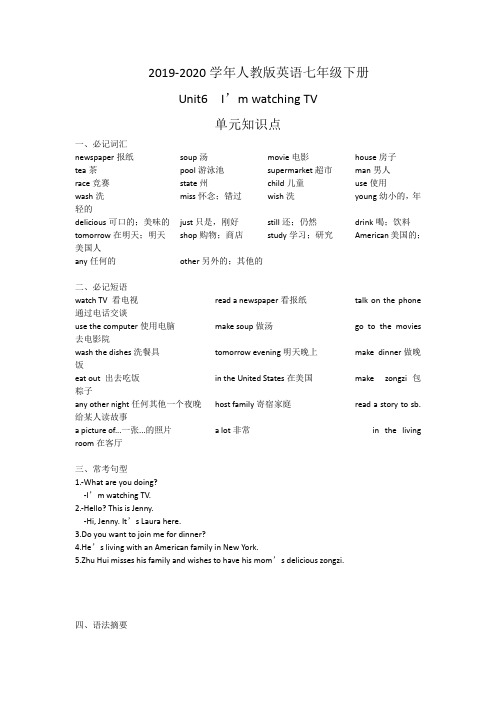
2019-2020学年人教版英语七年级下册Unit6 I’m watching TV单元知识点一、必记词汇newspaper报纸soup汤movie电影house房子tea茶pool游泳池supermarket超市man男人race竞赛state州child儿童use使用wash洗miss怀念;错过wish洗young幼小的,年轻的delicious可口的;美味的just只是,刚好still还;仍然drink喝;饮料tomorrow在明天;明天shop购物;商店study学习;研究American美国的;美国人any任何的other另外的;其他的二、必记短语watch TV 看电视read a newspaper看报纸talk on the phone 通过电话交谈use the computer使用电脑make soup做汤go to the movies 去电影院wash the dishes洗餐具tomorrow evening明天晚上make dinner做晚饭eat out 出去吃饭in the United States在美国make zongzi包粽子any other night任何其他一个夜晚host family寄宿家庭read a story to sb.给某人读故事a picture of...一张...的照片 a lot非常in the living room在客厅三、常考句型1.-What are you doing?-I’m watching TV.2.-Hello? This is Jenny.-Hi, Jenny. It’s Laura here.3.Do you want to join me for dinner?4.He’s living with an American family in New York.5.Zhu Hui misses his family and wishes to have his mom’s delicious zongzi.四、语法摘要重点:现在进行时的定义、结构、标志词及动词ing形式的变化规则。
人教版七年级下册英语-Unit-6-I’m-watching-TV-知识点总结

七下Unit 6 I’m watching TV一. Important Phrases:1.clean the house 打扫房子2.read a newspaper 看报纸★news(不可数),paper(纸,不可数;试卷/论文,可数)3.talk on the phone 打电话★on the radio 在广播上,on the Internet 在网络上,on TV在电视上4.listen to a CD 听唱片5.use the/a computer 用电脑★useful(adj.)有用的,useless(adj.)无用的6.use...to do sth 用...做某事7.make soup 做汤★have soup 喝汤区别soap(n.)肥皂8.wash the dishes 清洗餐具★=do the dishes 表示碗碟时用复数“the dishes”,a dish一道菜9.wash one’s clothes 洗衣服★=do some washing10.go to the movies 去电影院★=go to the cinema11.kind of interesting 有点有趣kindof=a little=a bit 一点,有点12.a kind of一种类型13.all kinds of 多种类型★different kinds of 各种各样14.not much 没什么事★=nothing much15.join me for dinner 和我一起吃晚饭16.eat out 出去吃饭★=go to the restaurant 去餐馆17.drink tea 喝茶★black tea(红茶),green tea(绿茶),oolong tea(乌龙茶),milk tea(奶茶)18.see you tomorrow/then 明天/那时见★the day after tomorrow 后天19.swimming pool 游泳池20.shop at in the supermarket 在超市购物★superman 超人super star超级明星21.study in the United States 在美国学习★近义词learn(学习)22.live with an American family 和一个美国家庭住一起23.Dragon Boat Festival 端午节★dragonfly 蜻蜓24.watch the boat races 看划船比赛25.be like any other night 像其他晚上一样26.host family 寄宿家庭★host“主人,主持人”, guest“客人”27.read a story to sb 念故事给...听★reader 读者28.miss his family 想念他的家人29.wish(sb)to do sth.想要做某事★Best wishes最美好的祝愿30.think about 考虑31.in the living room 在客厅32.take photos of...给...照相33.take turns doing sth 轮流做某事★It’s your turn.轮到你了!34.study for a test 为考试而学习二、Key Language Points:1.What's he doing? ---He is using the computer. 他在做什么?他在用电脑。
Unit6I’mwatchingTV知识点人教版七年级英语下册

Unit 6 I’m watching TV 词汇精讲一、词组、短语及用法【重点短语】1.watch TV看电视2. read a newspaper 看报纸3. talk on the phone 通过交谈4. listen to a CD 听CD5. a useful book 一本有用的书6. make soup 做汤7. wash the dishes 洗碟子8. go to the movies 去看电影9. at home 在家10. eat out 在外面吃11. drink tea 喝茶12.Dragon Boat Festival 端午节13. make zongzi 包粽子14. watch the boat races 看龙舟比赛15. the night before the festival 节日前的晚上16. any other night 任何其他的晚上17. his host family 他的寄宿家庭18. read a story to sb 读故事给某人19. miss sb. 思念某人miss doing sth 错过做某事20. wish to do sth希望做某事wish sb to do sth希望某人做某事hope to do sth希望做某事21. no place like home 没有地方像家一样22. in the United States 在美国23. study for a test 为一个考试而学习1.newspaper(1)newspaper意为“报纸”,是可数名词。
“在报纸上”用英语表示为“in the/a newspaper”,不能用介词on。
我们日常所说的晨报/晚报是morning / evening newspapers。
例如:She likes reading newspapers. 她喜欢看报纸。
(2)newspaper是由news和paper构成的合成词,合成词是一种重要的构词法,对我们记忆单词很有帮助。
人教版英语七年级下册 Unit 6 I’m watching TV基础知识点讲解、练习
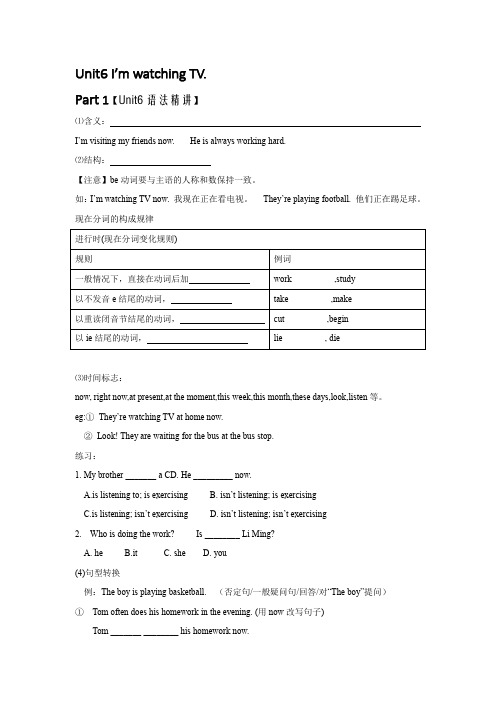
Unit6 I’m watching TV.Part 1【Unit6语法精讲】⑴含义:I’m visiting my friends now.He is always working hard.⑵结构:【注意】be动词要与主语的人称和数保持一致。
如:I’m watching TV now. 我现在正在看电视。
They’re playing football. 他们正在踢足球。
现在分词的构成规律⑶时间标志:now, right now,at present,at the moment,this week,this month,these days,look,listen等。
eg:①They’re watching TV at home now.②Look! They are waiting for the bus at the bus stop.练习:1. My brother _______ a CD. He _________ now.A.is listening to; is exercisingB. isn’t listening; is exercisingC.is listening; isn’t exercisingD. isn’t listening; isn’t exercising2.---Who is doing the work? ---Is ________ Li Ming?A. heB.itC. sheD. you(4)句型转换例:The boy is playing basketball. (否定句/一般疑问句/回答/对“The boy”提问)①Tom often does his homework in the evening. (用now改写句子)Tom _______ ________ his homework now.②She’s reading in the school library. (改为一般疑问句,并作否定回答)---_______ _______ ________ in the school library? ---No, she ________.③Alice is writing a letter. (就画线部分提问) _______ _______ Alice _______ ?④David is reading in his room. (改为否定句) David _______ _______ in his room.⑤Mr. Wang is playing basketball. (对划线部分提问) _______ _______ Mr. Wang _______?(5)现在进行时与一般现在时的区别①现在进行时表示动作的暂时性,而一般现在时表示动作的习惯性和经常性I am watching TV now. (暂时性)I watch TV every day. (经常性)②现在进行时可表示短暂性动作,而一般现在时表示长久性动作。
人教版七年级下册英语Unit 6 I’m watching TV.知识点大归纳
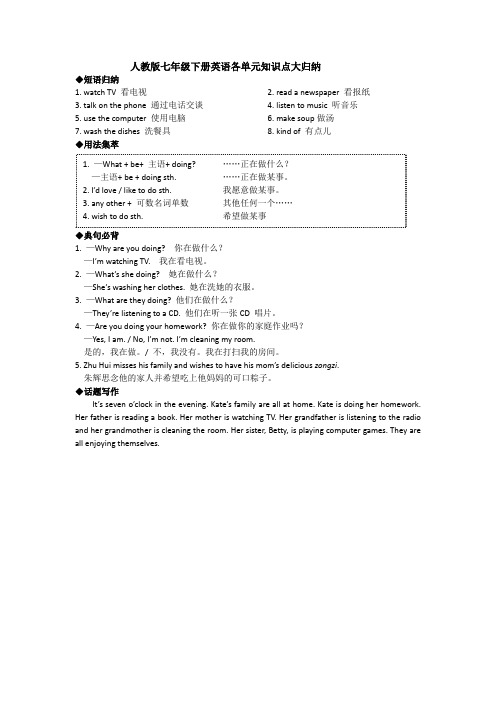
人教版七年级下册英语各单元知识点大归纳◆短语归纳1. watch TV 看电视2. read a newspaper 看报纸3. talk on the phone 通过电话交谈4. listen to music 听音乐5. use the computer 使用电脑6. make soup做汤7. wash the dishes 洗餐具8. kind of 有点儿◆用法集萃1. —What + be+ 主语+ doing? ……正在做什么?—主语+ be + doing sth. ……正在做某事。
2. I’d love / like to do sth. 我愿意做某事。
3. any other + 可数名词单数其他任何一个……4. wish to do sth. 希望做某事◆典句必背1. —Why are you doing? 你在做什么?—I’m watching TV. 我在看电视。
2. —What’s she doing? 她在做什么?—She’s washing her clothes. 她在洗她的衣服。
3. —What are they doing? 他们在做什么?—They’re listening to a CD. 他们在听一张CD 唱片。
4. —Are you doing your homework? 你在做你的家庭作业吗?—Yes, I am. / No, I’m not. I’m cleaning my room.是的,我在做。
/ 不,我没有。
我在打扫我的房间。
5. Zhu Hui misses his family and wishes to have his mom’s delicious zongzi.朱辉思念他的家人并希望吃上他妈妈的可口粽子。
◆话题写作It’s seven o’clock in the evening. Kate’s family are all at home. Kate is doing her homework. Her father is reading a book. Her mother is watching TV. Her grandfather is listening to the radio and her grandmother is cleaning the room. Her sister, Betty, is playing computer games. They are all enjoying themselves.。
人教版初一下册Unit-6-I’m-watching-TV知识点

Unit6 I’m watching TV一、词组、短语及用法1. 现在进行时态的构成:主语+ be+ v-ing表示此时此刻正在发生或正在进行的动作2. do one’s homework (此处的do是“做”的意思)3. talk on the phone 打电话交谈4. watch look see read 的大致区别:watch 观看,看watch TV 看电视watch a football game 看一场足球比赛see 看见(看的结果)I can see the bird in the tree.look 看(看的动作)Please look at the blackboard.read 阅读,读书,读报She is reading a story.5. go to the movies 去看电影6. That sounds good. 那听起来不错7. TV show 电视节目8. at six o’clock 在六点钟9. wait for sb /sth 等侯某人/某物10. all 、also 、often 、never 等副词应该放在be动词,情态动词及助动词之后,行为动词之前。
He never stop talking. I often get up at six.We are all students. The boys can also swim.They all like English. Lions also come from South Africa.12. thanks for sth 谢谢某物Thanks for your letter.thanks for doing sth 谢谢做了某事Thanks for joining us.13. some of + 宾格代词(us / you /them )some of us 我门当中的一些人Some of +名词复数some of the students 一些学生14. in the first /second /next / last photo 在第一/第二/下一个/最后一张照片里15. at school 在学校at home 在家at the pool 在游泳池at the mall在商店16. be with sb 与某人一起He is with his parents. 他和他的父母在一起。
七年级英语下册Unit6I’mwatchingTV短语、语法知识点汇总(新版)人教新目标版
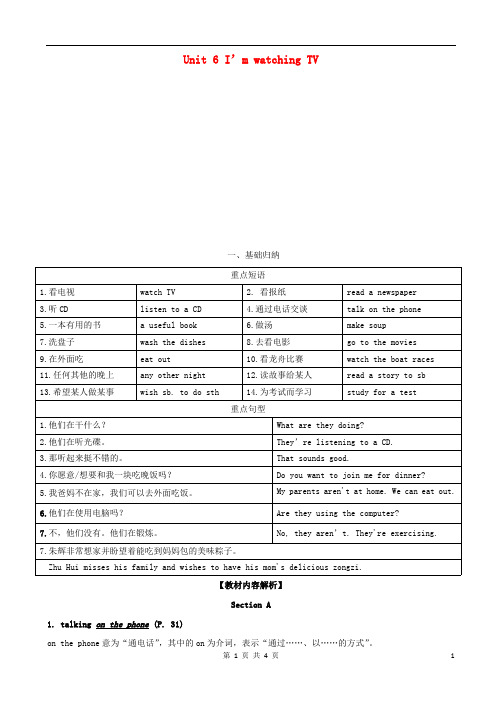
Unit 6 I’m watching TV一、基础归纳【教材内容解析】Section A1. talking on the phone (P. 31)on the phone意为“通电话”,其中的on为介词,表示“通过……、以……的方式”。
Jenny is listening to the news on the radio.2. using the computer (P. 31)use此处用作及物动词,意为“使用、运用”,use sth. to do sth.“用某物做某事”。
I use a knife to cut bread.3. This is Jenny. (P. 32)这是打电话的常用语,相当于This is Jenny speaking,在电话用于中,一般用this表示“我”,that表示“你”。
---Is that Tom speaking?---No, this is Tom’s father.4. I’m just washing my clothes. (P. 32)just此处用作副词,意为“只是、恰好”。
I just want to talk to you.It’s just two o’clock.5. Do you want to join me for dinner? (P. 32)① join+组织/团体,表示“加入到某个组织中并成为其中一员”。
He joined the army in 1990.Nowadays more and more people join the swimming club to build their bodies.② join+sb. (in sth.)表示“加入到某些人当中去”。
Would you like to join us in the computer game?③ join in表示参加某种活动,相当于take part in。
新目标英语七年级下第六单元Unit-6-I’m-watching-TV-知识点

Unit 6 I’m watching TV SectionA重点单词1.Newspaper cn 报纸news +paper 看报_________2. Use vt /n使用_______ adj有用的_________adj无用的_________用..做某事3.soup un _________ rice_________ noodles _________ bread _________做汤_________4 wash vt 洗脸__________洗衣服_________洗手________5Movie cn 电影_________ 看电影_________ 去看电影6house cn _________ 马7 drink _________现在分词_________喝水_________喝茶What about +n,pron,doing …怎么样?重点词组看电视_________看报纸_________通过电话交谈_________ 听CD _________用电脑_________喝汤_________ 洗衣服_________有点_________那听起来是好的_________电视节目_________。
.怎么样?_________打扫房间_________在家_________出去吃_________我乐意_________与某人一起做某事_________让我们先在我家见面__________________在6点半_________在周末_________ 什么时间_________ 做汤_________ 轮流_________二、语法和句型1. 现在进行时的结构:主语+be+v-ing。
如:(1) The boy is _________ (run)with his father。
(2)My brother and I are __________ (play) soccer。
人教新目标七年级英语下册Unit 6 I'm watching TV.基础知识汇总与默写清单

人教新目标七年级英语下册Unit 6 I'm watching TV.基础知识汇总与默写清单Section A【重点单词】1.newspaper n.报纸e v.使用;运用3.soup n.汤4.wash v.洗5.movie n.电影6.just adv.只是;恰好7.house n.房子8.drink v.喝n.饮料9.tea n.茶;茶叶10.tomorrow adv.在明天n.明天;未来【单词变形】1.newspaper—newspapers(复数)2.house—houses(复数)3.movie—movies(复数)4.make—makes(第三人称单数)—making(现在分词)5.wash—washes(第三人称单数)—washing(现在分词)e—uses(第三人称单数)—using(现在分词)7.drink—drinks(第三人称单数)—drinking(现在分词)8.watch—watches(第三人称单数)—watching(现在分词)【重点短语】e the computer使用电脑2.make soup做汤3.wash the dishes清洗餐具4.kind of有点儿5.go to the movies去电影院6.not much没什么事7.watch TV看电视8.read a newspaper看报纸9.talk on the phone通电话10.listen to…听……11.wash one's clothes洗某人的衣服12.join sb.for sth.加入某人一起做某事13.at home在家14.eat out出去吃饭15.at one's home在某人家里16.at half past six在六点半17.play basketball打篮球18.on Mondays在每周一19.every night每天晚上/夜里20.in the mornings在(每天)早上21.make dinner做晚饭22.every Saturday每周六23.drink/have tea喝茶24.after dinner晚饭后25.tomorrow evening明天晚上26.what time几点钟27.read a book看书【重点句型】1.——他们在干什么?——他们在听CD。
新目标英语七年级下册Unit6_I’m_watching_TV知识点

新⽬标英语七年级下册Unit6_I’m_watching_TV知识点Unit 6 I’m watching TV.词组◆watch TV 看电视◆read a newspaper 读报纸◆talk on the phone◆listen to a CD 听CD◆use the computer 使⽤电脑◆make soup/ zongzi 做汤/粽⼦◆wash the dishes=do the dishes 洗碗◆go to the movies=see a film=go to cinema 看电影(3种表达)看书看电视看我◆Not much.=Nothing much 没有什么。
◆wash one’s clothes 洗⾐服◆eat out 出去吃◆meet at my home◆ see you then 到时见◆talk about sth 谈论某事Talk sb 和某⼈谈话◆in the tree 在树上(树外之物)◆on the tree 在树上(树上长出来的)◆drink tea◆do some cleaning/reading 做清洁/阅读◆in the United States= in the US 在美国◆ Dragon Boat Festival: 端午节◆live with sb. 和……住在⼀起住在成都◆boat races◆any other night 其他任何⼀个夜晚(any other + 可数名词any other night / picture / singer)◆host family 寄住家庭◆miss one’s family 想念家⼈◆ wish to do sth 希望做某事◆ talk on the phone 在电话上交谈◆ That sounds good. 那听起来不错◆ wait for sb 等待某⼈◆ a useful book ⼀本有⽤的书◆ study for a test 为⼀个考试⽽学习study for sth. 为了什么⽽学习◆ Be like 像sound like 听起来像look like 看起来像◆对某⼈友好◆thanks for = thank you for… 为某事⽽感谢◆ Wha t’s he doing? 他正在⼲嘛?◆He’s reading. 他正在阅读。
新人教 英语 七年级下册Unit6 I’m watching TV知识点详解

Unit6 I’m watching TV.知识点详解单元目标总览:【知识点详解】1、What are you doing? 你在做什么?这是一个现在进行时的特殊疑问句,询问别人正在做什么。
它的结构是“特殊疑问词+be+主语+doing+其他+?”。
对于特殊疑问句的回答,要根据实际情况来定。
例如:◆-What is your mother doing? 你妈妈在做什么?-She is watering the flowers. 她在浇花。
◆-Who is playing the piano? 谁在弹钢琴?-My sister. 我姐姐/妹妹。
◆-What’s she doing? 她正在什么?-She is washing her clothes. 她正在洗衣服。
2、reading a newspaper看报纸(1)newspaper意为“报纸”,是可数名词。
“在报纸上”用英语表示为“in the/a newspaper”,不能用介词on。
我们日常所说的晨报/晚报是morning / evening newspapers。
◆She likes collecting old newspapers. 她喜欢收集旧报纸。
(2)newspaper是由news和paper构成的合成词,合成词是一种重要的构词法,对我们记忆单词很有帮助。
例如:bed + room→ bedroom 卧室class + room →classroom 教室head + phone →headphone 耳机police + man→ policeman 警察basket + ball→basketball 篮球3、talking on the phone通过电话交谈On the phone意为“通过电话”,其中on为介词,意为“通过;以......的方式”。
◆The boy is talking on the phone with his friends.这个男孩和朋友在打电话。
七年级英语下册Unit6I’mwatchingTV知识点详解素材新版人教新目标版

Unit 6 I'm watching TV1.现在进行时态:(1).谓语动词:be + V-ing1).be动词要受主语影响变为am, is, are.2).V-ing又叫现在分词。
(2). 现在分词的构成规则如下:1). 一般动词后直接加-ing.如:reading, watching, seeing2). 以不发音的e结尾的词去掉e再加-ing.如: make—making write—writing3). 以重读、闭音、单辅音字母结尾的词,双写这个辅音字母,再加-ing.如:get-getting swim-swimming put-putting run-running(3)用法:1)表示现在(说话瞬间)正在进行或发生的动作。
(不能指状态。
)2)表示现阶段正在进行,而此刻不一定在进行的动作。
(以these days为代表)3)表即将发生的动作。
这类词有:come, go, leave, arrive等,常与表将来的时间状语连用。
(4)常见标志:1)句中有:now, hear, look等.如:He is doing his homework now.Look, what is the girl drawing?2).含现在进行时的问答。
如:--Are you mending your pen? –No, I’m mending my bike.你正在修笔吗?不,我正在修我的自行车。
3)用现在进行时回答表特殊的地点:如:--Where’s Tom? –He is washing clothes. (即在洗衣服的地方可找到他。
)4)前句是“It’s + 时间”句子。
如:It’s six o’clock now. Jim is having supper.(5). 现在进行时的一般疑问句及回答:一般疑问句把be动词提前;回答用Yes,主语+be或No,主语+be+not。
如:Are you making the bed? Yes, I am.Is the girl drawing a picture? No, she isn’t.(6). 现在进行时的否定句:在be动词后加not。
七下Im watchingTV知识点
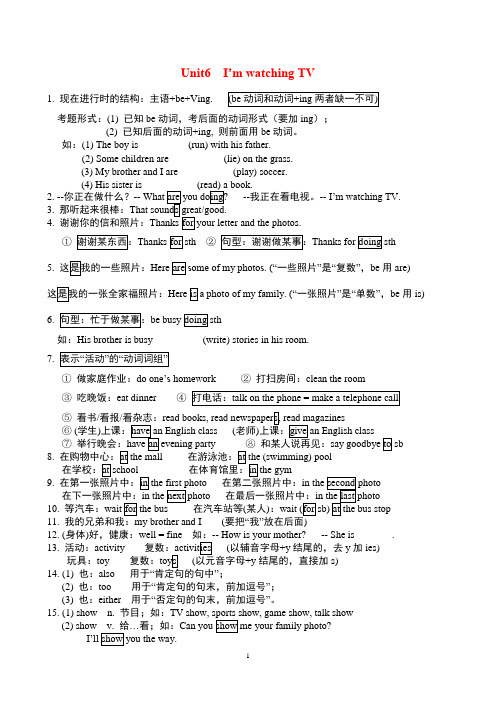
Unit6 I’m watching TV1. 现在进行时的结构:主语+be+Ving.考题形式:(1) 已知be动词,考后面的动词形式(要加ing);(2) 已知后面的动词+ing, 则前面用be动词。
如:(1) The boy is _________ (run) with his father.(2) Some children are __________ (lie) on the grass.(3) My brother and I are __________ (play) soccer.2. --你正在做什么?--我正在看电视。
-- I’m watching TV.3. 那听起来很棒:4. 谢谢你的信和照片:①②5. some of my photos. (―一些照片‖是―复数‖,be用are)a photo of my family. (―一张照片‖是―单数‖,be用is)6.如:His brother is busy _________ (write) stories in his room.7.①做家庭作业:do one’s homework②打扫房间:clean the room③吃晚饭:eat dinner ④⑤看书/看报/⑥ (学生)(老师)⑦8.9.10. 等汽车:在汽车站等(某人):11. (要把―我‖12. (身体)好,健康:well = fine -- She is _______.13. 活动:activity (以辅音字母+y结尾的,去y加ies)玩具:toy 复数:(+y结尾的,直接加s)14. (1) 也:also 用于―‖;(2) 也:too 用于―肯定句的句末,前加逗号‖;(3) 也:either 用于―否定句的句末,前加逗号‖。
15. (1) show n. 节目;如:(2) show v. 给…看;如:一般现在时The Simple Present Tense一般现在时表示现在的状态;表示经常性或习惯性的动作;表示主语具备的性格和能力等。
- 1、下载文档前请自行甄别文档内容的完整性,平台不提供额外的编辑、内容补充、找答案等附加服务。
- 2、"仅部分预览"的文档,不可在线预览部分如存在完整性等问题,可反馈申请退款(可完整预览的文档不适用该条件!)。
- 3、如文档侵犯您的权益,请联系客服反馈,我们会尽快为您处理(人工客服工作时间:9:00-18:30)。
Unit6 I’m watching TV1. 现在进行时的结构:主语+be+Ving.考题形式:(1) 已知be动词,考后面的动词形式(要加ing);(2) 已知后面的动词+ing, 则前面用be动词。
如:(1) The boy is _________ (run) with his father.(2) Some children are __________ (lie) on the grass.(3) My brother and I are __________ (play) soccer.2. --你正在做什么?--我正在看电视。
-- I’m watching TV.3. 那听起来很棒:4. 谢谢你的信和照片:①②5. some of my photos. (―一些照片‖是―复数‖,be用are)a photo of my family. (―一张照片‖是―单数‖,be用is)6.如:His brother is busy _________ (write) stories in his room.7.①做家庭作业:do one’s homework②打扫房间:clean the room③吃晚饭:eat dinner ④⑤看书/看报/⑥ (学生)(老师)⑦8.9.10. 等汽车:在汽车站等(某人):11. (要把―我‖12. (身体)好,健康:well = fine -- She is _______.13. 活动:activity (以辅音字母+y结尾的,去y加ies)玩具:toy 复数:(+y结尾的,直接加s)14. (1) 也:also 用于―‖;(2) 也:too 用于―肯定句的句末,前加逗号‖;(3) 也:either 用于―否定句的句末,前加逗号‖。
15. (1) show n. 节目;如:(2) show v. 给…看;如:一般现在时The Simple Present Tense一般现在时表示现在的状态;表示经常性或习惯性的动作;表示主语具备的性格和能力等。
例如:1、He is twelve. 他十二岁。
2、I go to school at seven every day.3、They speak Japanese.一般现在时常和表示时间频度的副词连用。
如:often, usually, sometimes, always, never, hardly ever等。
1. I often read books in the evening.2. Do they usually go to school by bike?3. He doesn’t like milk. He never drinks it.4. Sometimes my mother gets back at five.一般现在时常和以下时间表达法连用。
如:in the morning, in the afternoon, in the evening, at noon, at night, every day, on Sunday(s), at seven 等。
Do they have math in the morning?She sleeps nine hours every night.It takes me two hours to do my homework every day.They don’t have classes on Sundays.它有三种形式:一、谓语是be的一般现在时。
1、肯定形式是:主语+be+表语(形容词、名词充当表语)。
2、否定形式是:主语+be+not+表语(形容词、名词充当表语)。
3、一般疑问句是:Be+主语+表语(形容词、名词充当表语)?肯定回答是:Yes,主语+be. 否定回答是:No, 主语+ be+not.4、特殊疑问句是:特殊疑问词+Be开头的一般疑问句?注意:be要随着主语变。
二、谓语是情态动词can/may.....+动词原形的一般现在时。
1、肯定形式是:主语+情态动词can/may.....+动词原形+宾语。
2、否定形式是:主语+情态动词can/may.....+not+动词原形+宾语。
3、一般疑问句是:情态动词can/may.....++动词原形+主语+宾语。
肯定回答是:Yes,主语+情态动词. 否定回答是:No, 主语+ 情态动词+not.4、特殊疑问句是:特殊疑问词+情态动词can/may.....开头的一般疑问句?注意:情态动词can/may.....+动词原形。
三、谓语动词是实义动词及物动词或不及物动词的一般现在时。
1、肯定形式是:―主语+及物动词+宾语‖或―主语+不及物动词‖。
2、否定形式是:―主语+don't/doesn't+及物动词+宾语‖或―主语+don't/doesn't+不及物动词‖。
3、一般疑问句是:―Do/Does+主语+及物动词原形+宾语‖或―Do/Does+主语+不及物动词原形‖。
肯定回答是:Yes,主语+do/does. 否定回答是:No, 主语+ don't/doesn't.4、特殊疑问句是:特殊疑问词+do/does开头的一般疑问句?注意:根据主语确定用do还是does。
动词第三人称单数的构成:(用于第三人称单数、可数名词的单数和不可数名词的一般现在时中)1、直接加--slook—looks read—reads play—plays stop—stops2. 在字母s, x,ch,sh,o后加--esmiss—misses fix—fixes watch—watches wash—washesgo—goes do--does3. 辅音字母加y结尾的动词变y为i,再加-escarry–carries study–studies hurry–hurries cry–cries4.特殊的have -- has现在进行时(1)构成形式:Be动词+动词的ing形式这里强调一点,两者缺少其中任何一种都不可以构成现在进行时。
(2)现在进行时表示动作正在进行或事情正在发生。
(3)有用的依据:一个句子中既有be动词,又有动词,且动词加了ing ←→ 该句是现在进行时(4)句中往往有now、look、listen等词。
right----write sun----son no----know here---hear who’s----whose近义词:many----a lot of / lots of large----big desk----tablephoto---picture lamp----light like----love反义词或对应词:old----new go----come big----smallopen----close black----white here----there完整形式:let’s=let us(让我们) I’d=I would can’t=can not I’m=I am词性变换:one(序数词) first monkey(复数)monkeys skiing(原形)ski is(复数)are families(单数)family make(现在分词)making we are(缩略形式)we’re do(第三人称单数)does have(第三人称单数)has photo(复数)photos good(反义词)bad【时态综合练习】一.用动词的适当形式填空。
1. We often______(play) in the playground.2. He _____(get) up at six o’clock.3. _____you ______(brush) your teeth every morning.4. What (do) ______he usually (do)______ after school?5. Danny _____(study) English, Chinese, math, science and art at school.6. Mike sometimes ________(go) to the park with his sister.7. At eight at night, she __________(watch) TV with his parents.8. The girl_______(not eat)bananas now.9. ----Where____they____(stand)?----They are standing over there.10. Look!The boy over there_______(play) a model plane.11. ----What is Meimei doing now?----She______(watch)TV with her parents二、按照要求改写句子1. Daniel watches TV every evening. (改为否定句)2. I do my homework every day. (一般疑问句否定回答)3. Amy is playing computer games. (一般疑肯定回答)4. I like taking photos in the park. (对划线部分提问)5. John is from Canada. (对划线部分提问)_6. Tom does his homework at home. (改为否定句)7. They are doing their homework.一般否定句:8.The students are cleaning the classroom . 一否:9.I’m playing football on the playground .(对提问)10.Tom is reading books in his study . (提问)三、单项选择( ) 1. _________Alice often play the piano. No, she __________.A. Do; doB. Does; doesC. Does; doesn’tD. Do; does( )2. ________ your pen friend _______ in Beijing?A. Do; liveB. Do; livesC. Does; liveD. Does; lives( )3. ---When _______ he get home on Friday?----He gets home at four on Friday.A. doB. doesC. didD. dosn’t( )4. I like ________ very much. What about you?A. danceB. dancedC. dancingD. is dancing( )5. Summer _________ spring.A. comes afterB. comes ines beforees for( )6. Fangfang is a good student. She _______math.A. does good atB. well do itC. does well inD. do well in( )7. The kite _______ a bird.A. look likeB. is lookingC. looks likeD. looks at( )8. Bill and I _______ good friends.A. isB. areC. amD. be( )9. Sandy often ________ his homework on Sundays .A. doB. doesC. didD. don’t( )10. What do you usually do on the weekend? I usually__________.A. went swimmingB. go swimmingC. going swimmingD.is swimming( )11. The Greens____supper now.A:is having B:are having C:is haveing D:are have ing( )12. The children are____TV.A:watch B:seeing C:watching D:reading( )13. Are the boys looking at the blackboard? Yes,they____.A:aren't B:do C:don't D:are( )14. --Do you have a red pen?Which of the following is wrong? --____.A:Yes; I have one B:Yes,I have it C:Yes,I do D:Sorry,I don't( )15.--Excuse me.May I borrow a pen,please? --____.A:It doesn't matter; B:Thank you; C:Certainly,here you are; D:Not at all.( )16. The boy is late for class.So he says to the teacher,"_______A:I'm sorry B:Excuse me,May I come in? C:Let me in, D:I don't want to be late ( )17. What do you usually do on your holiday? –I usually______.A. saw elephantsB. sing and danceC.took picture( )18. I ________ a student. I go to school _______bus every day.A. is; byB. am; onC. am; byD. are; by( )19. I _______ a brother. She _______ a sister.A. have; hasB. has; hasC. have; haveD. has, have( )20. You _________ a student. He ________ a teacher.A. is; isB. are; isC. are; are B. is; are( )21. He always _________ football games.A. watchesB. watchC. watchedD. is watching( )22. My best friend _______ stamps.A. collectsB. collectC. collectedD. collecting( )23. She doesn’t ________ listening to the music.A. likedB. likeC. likesD. liking( )24. My mother and I _________ always watch romantic films.A. doesn’tB. don’tC. doD. does( )25. Jack is_____with Jim.They are good____.A running; friend;B running; friends;C runing; friendsD run; friend's ( )26. Look! Mary____doing____homework.A:is;one's B:is;her C:are;his D:are;her( )27.The Greens____supper now.A:is having B:are;having C:is haveing D:are;having( )28. Jack is_____with Jim.They are good____.A:running;friend; B:running;friends; C:runing;friends D:run;friend's。
